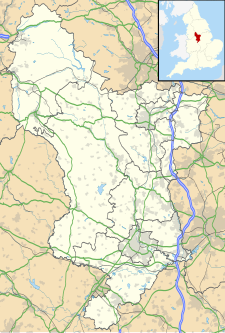Derbyshire Royal Infirmary
| Derbyshire Royal Infirmary | |
|---|---|
| Derby Teaching Hospitals NHS Foundation Trust | |
 Pepper Pot Towers | |
| Geography | |
| Location | Derby, England |
| Coordinates | 52°54′54″N 1°28′16″W / 52.915°N 1.471°W |
| Organisation | |
| Care system | NHS |
| History | |
| Opened | 1810 (as Derbyshire General Infirmary) |
| Closed | 2009 |
| Links | |
| Lists | Hospitals in England |
The Derbyshire Royal Infirmary was a hospital in Derby that was managed by the Derby Teaching Hospitals NHS Foundation Trust.[1] Following the transfer of community services to the London Road Community Hospital located further south-east along London Road, the infirmary closed in 2009 and most of the buildings were demolished in spring 2015.
History
[edit]Derbyshire General Infirmary
[edit]In early 1803, the Reverend Thomas Gisborne and Isaac Hawkins Browne Esq. (Trustees of the late Isaac Hawkins Esq.) signified their intention to appropriate £5,000 towards an infirmary to be erected at Derby.[2]
On 5 April 1803, following a request from the Grand Jury, the High Sheriff of Derby (Robert Wilmot) held a meeting to consider the founding of a hospital in Derby. At this meeting it was noted that subscriptions promised had already reached £17,215, with a further £2,592 and 18 shillings annually.[3]
On 6 October 1803, a committee was appointed consisting of all subscribers of more than £50 and it was decided that the first payment of 25% of more would be required by 12 January 1804.[4]
The infirmary building, principally under the inspiration of the cotton manufacturer, William Strutt,[5] made a deliberate attempt to incorporate into a medical institution the latest “fireproof” building techniques with technology developed for the textile mills.[6] The Infirmary building opened in what is now Bradshaw Way, Derby on 4 June 1810.[7][8]
Derbyshire Royal Infirmary
[edit]In 1890, during the year that he was Mayor of Derby, Sir Alfred Seale Haslam managed to replace the old Derbyshire General Infirmary with the Derbyshire Royal Infirmary. That year there had been an outbreak of disease at the old infirmary and Sir William Evans, President of the Infirmary arranged a three-day inspection which condemned the old building.[9] When Queen Victoria came to lay a foundation stone for the new hospital on 21 May 1891 she knighted Haslam for his services and gave permission for the term "Royal" to be used.[9] The new Derbyshire Royal Infirmary, designed by the architects Young and Hall, was completed and officially opened in 1894.[10][7]
In the 2000s, most services were gradually transferred to the new Royal Derby Hospital, leaving only community services on the Infirmary site. Following the transfer of the community services to the London Road Community Hospital located further south-east along London Road, the infirmary closed in 2009[11] and most of buildings were demolished in spring 2015.[12] However a facade with its two "pepper-pot towers" dating back to 1894 was retained for redevelopment.[10]
Nightingale Quarter
[edit]Redevelopment on the former site of the Derbyshire Royal Infirmary started in 2020 after initially being halted due to the coronavirus pandemic. Renamed the 'Nightingale Quarter' - after Florence Nightingale - by developer Wavensmere Homes, the new site covers 18.5 acres and includes over 900 new residential properties.[13]
In 2022, Wavensmere Homes appointed Joseph Mews Property Group to bring the first release of these apartments - The Pavilion - to market.[14] The "pepper-pot towers" were turned into on-site amenities for residents including a gym and restaurant, while the existing exteriors were restored.[15]
Gallery
[edit]-
Derbyshire Royal Infirmary in 1891
-
Florence Nightingale stained glass window, originally at the Derbyshire Royal Infirmary Chapel
-
1893 Floor plan of Derbyshire Royal Infirmary
-
1893 Floor plan of Derbyshire Royal Infirmary
-
The infirmary in 2009
-
Derbyshire Royal Infirmary in 2017: only the two "pepper-pot towers" remain
See also
[edit]References
[edit]- ^ "Derby Hospitals website". Derbyhospitals.nhs.uk. 4 May 2012. Archived from the original on 21 February 2014. Retrieved 17 May 2012.
- ^ Derby Mercury 24 March 1803 (page 3) advertised the meeting (to ne held on 5 April 1803) to consider the erection of an infirmary at Derby.
- ^ Derby Mercury 7 April 1803 (page 3) reported the meeting to consider the erection of an infirmary at Derby.
- ^ Derby Mercury 6 October 1803 (page 3) reported general meeting of the subscribers to fund the erection and endowment of an infirmary.
- ^ Elliott, Paul (2000). "The Derbyshire General Infirmary and the Derby Philosophers: The Application of Industrial Architecture and Technology to Medical Institutions in Early-Nineteenth-Century England". Medical History. Retrieved 14 April 2018.
- ^ “The Derbyshire General Infirmary and the Derby Philosophers: The Application of Industrial Architecture and Technology to Medical Institutions in Early-Nineteenth-Century England“ by Paul Elliott, School of Geography,University of Nottingham, University Park, Nottingham, NG7 2RD.
- ^ a b "Derbyshire Royal Infirmary". National Archives. Retrieved 14 April 2018.
- ^ Derby Mercury 24 May 1810 (page 3) notice that Infirmary to open on 4 June 1810
- ^ a b Permanent Record of Queen Victoria's State Visit to Derby. Market Place, Derby: W.Hobson. 1891. p. 48.
- ^ a b "Thousands sign petition against demolition of Derby's 'pepper pot' towers". Derby Telegraph. 19 August 2017. Retrieved 14 April 2018.
- ^ "Former Derbyshire Royal Infirmary site up for sale". ITV. 17 February 2014. Retrieved 18 October 2018.
- ^ "Derby Royal Infirmary site: Demolition work begins". BBC. 23 January 2015. Retrieved 14 April 2018.
- ^ "Work begins on first homes at former Derbyshire Royal Infirmary site". DerbyshireLive. 2 September 2020. ISSN 0307-1235. Retrieved 7 March 2022.
- ^ "Redevelopment of Derby Royal Infirmary will offer contemporary apartments". DerbyshireLive. 3 February 2022. ISSN 0307-1235. Retrieved 7 March 2022.
- ^ "The Pavilion | Nightingale Quarter". Joseph Mews. Retrieved 7 March 2022.







